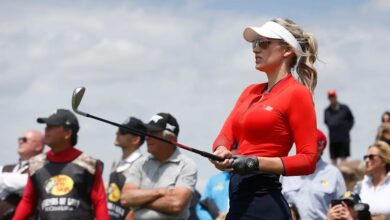Like Kournikova and Bouchard, Emma Raducanu now has a target on her back
Loss at Flushing Meadows exposed a level of vulnerability in the 2021 US Open champion that we have never before seen

As Emma Raducanu continues to scrabble for traction in her attempt to climb the tennis rankings, her disregard for traditional tennis niceties is becoming a significant handicap. We are not only talking about the shortage of match practice, even though that left Raducanu short of fluency in Tuesday night’s loss to Sofia Kenin. There is also the way it looks to her rivals.
They see a feted player with a massive social media following, and a multi-million dollar sponsorship portfolio, who nevertheless seems to consider herself above the regular tour appointments in places like Toronto and Cincinnati. The target on her back – which appeared as soon as she won the 2021 US Open – is only growing larger.
“We have seen this before whether it was Anna Kournikova or Eugenie Bouchard,” said one WTA insider. “Anna felt behind closed doors that the other girls raised their level and wanted to beat her so badly because they were jealous of what she had – fame and wealth. “You shouldn’t underestimate how that jealousy can manifest itself into added incentive to beat someone. It’s not as if Kenin has been lighting up the tour recently but she saw her opportunity on Tuesday and grabbed it.”
Raducanu has spent this whole year working on technical tweaks with her coach, Nick Cavaday, whom she trusts more than anyone else. She was so keen to reunite with him, Telegraph Sport understands, that the arrangement was struck well before she returned from double-wrist surgery last year.
Yet many observers have been surprised by her focus on the training court at the expense of matchplay. Even practice sets seem to have been few and far between. If she did not want to play qualifying in Toronto and Cincinnati – a decision which looks from the outside as if it might have been influenced by optics – then why not nip down to Bradenton in Florida, where her management agency IMG runs a giant tennis centre? She could have fitted in a bunch of unofficial, invisible matches with academy players, or even junior boys, and got the repetitions she needed.
As it was, Raducanu appeared distinctly undercooked in her 6-1, 3-6, 6-4 defeat. And when she spoke to reporters afterwards, we saw a hitherto unglimpsed side of her personality. A highly intelligent woman, she always engages with questions and provides thought-provoking answers, even if she is still hurting from the result. In most cases, she takes a broad perspective and downplays the importance of any individual outcome. Here, though, there was an unfamiliar sense of vulnerability. “I feel down, I feel sad,” Raducanu acknowledged, while wiping away tears. “This is a tournament I really want to do well in.”
The change of tone made one wonder whether there has been a belated realisation. Has Raducanu finally woken up to the scale of the task ahead of her? Like other young breakthrough winners (Kenin herself, Bianca Andreescu and Sloane Stephens come to mind), Raducanu has gone about the tour backwards, achieving renown before really knowing the ropes.
That “target effect” we spoke about earlier is much harder to deal with when you are still so green yourself. Yes, players also got up for facing Serena Williams. But she was a generational talent, who possessed such bulletproof self-belief that she actively relished facing ultra-motivated opponents. Williams also had locker-room power – the aura which derived from her peerless CV, and which often led her opponents to overplay.
In Raducanu’s case, people will be queuing up to draw her at the moment. She gives you a nice rhythm to work with, and her first serve, which averaged 97mph against Kenin, does not have enough pop to be scary. There is a top-20 player in there, but only if she can improve her physicality, resilience and mental stability under pressure.
I guess I have to take it as a compliment,” said Raducanu, when asked on Tuesday night about the way she seems to inspire the opposition. “I think I’ve had it a few times now when opponents have played really well against me. Yeah, it’s for a reason, I guess.”
Part of that reason is her ongoing insistence that she will do things differently to other players. When you are so ready to swim against decades of convention – whether that be by playing Wimbledon without a regular coach, as she did in 2022, or by treating qualifying events as if they are beneath you – you had better perform. Otherwise, you just look daft, and leave yourself in danger of losing the locker-room.
The last few weeks have recalled to mind the waspish comments of Sloane Stephens, the 2017 US Open champion, in the immediate aftermath of Raducanu’s initial flowering at the same event four years later. “Because she is so young it’s definitely a long road, so there’s going to be a lot of ups and downs,” Stephens said, after losing to Raducanu in the first round of the 2022 Australian Open. “I think she, yeah, has just a lot to learn.
“I was talking to someone in the locker-room,” Stephens added, “and I’m like, ‘We’ll be here when she comes down.’”



